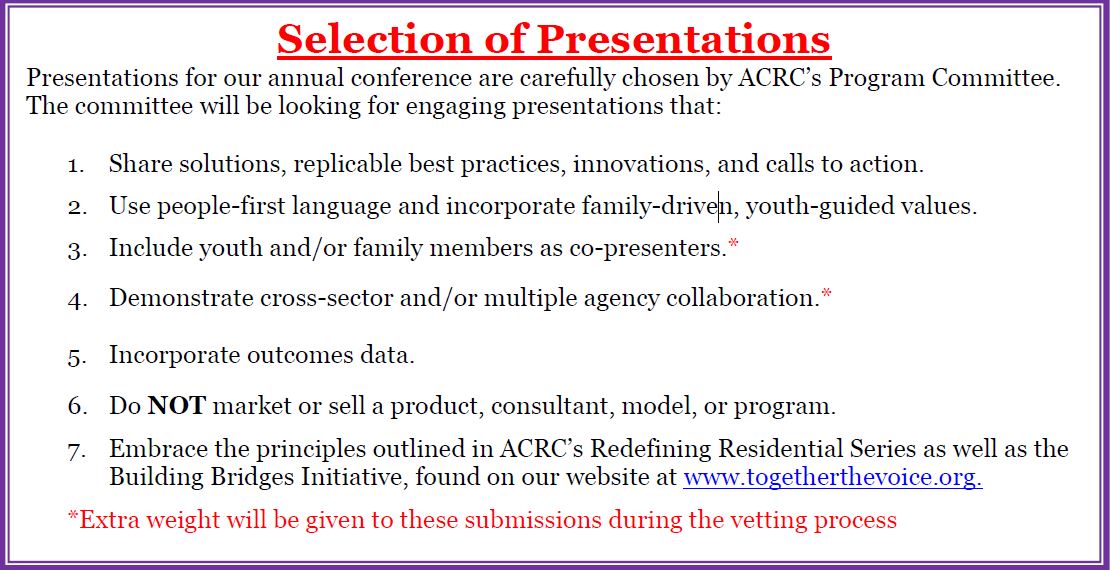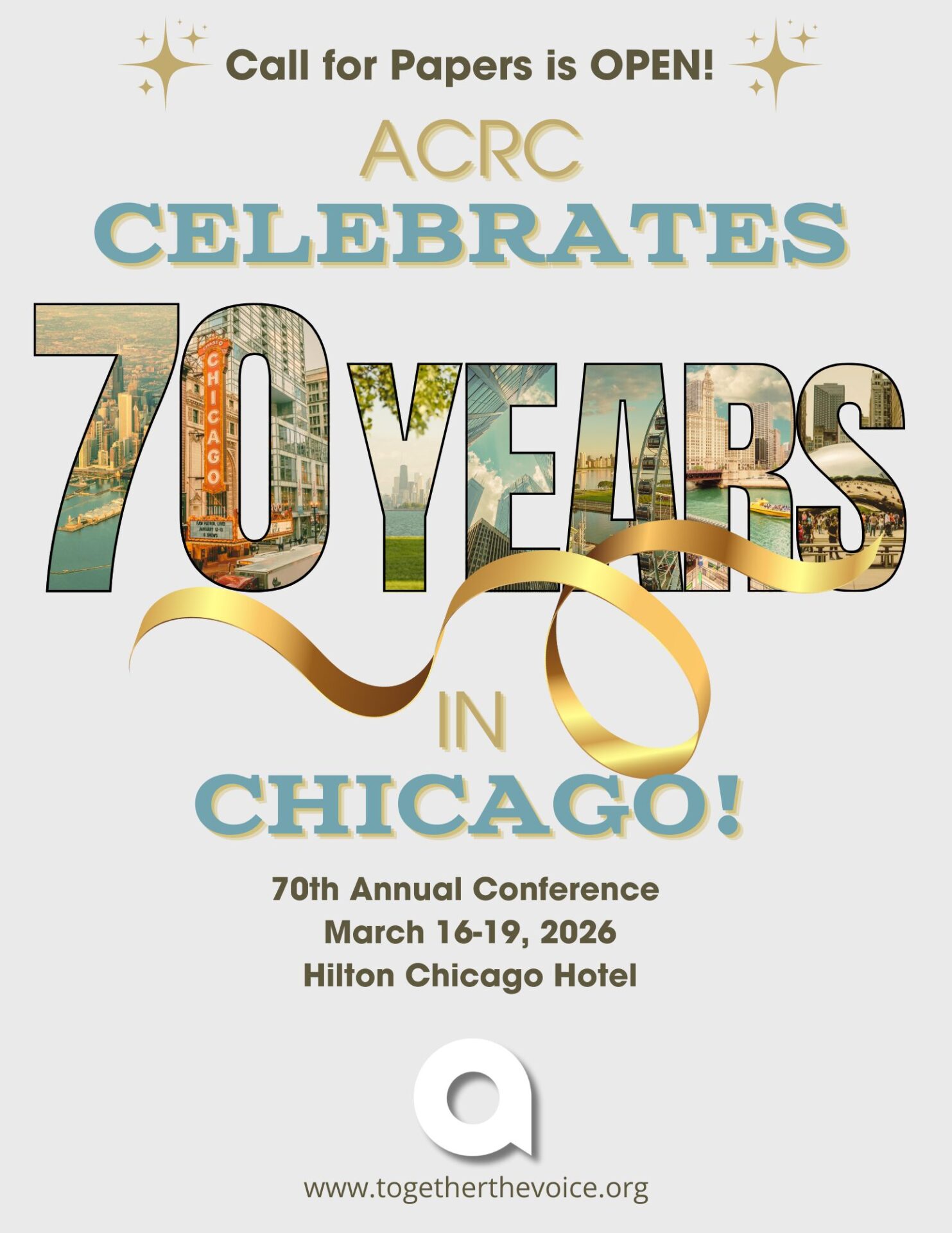Call for Papers
**NOW CLOSED**
Questions may be directed to:
Amanda Prange (414) 359-6548 or aprange@togetherthevoice.org
ACRC’s 70th Annual Conference, Quality is the Tie that Binds: Our Enduring Commitment to Excellence will be held March 16-19, 2026, in Chicago, Illinois, where ACRC was founded. Collectively, we have witnessed and/or led transformation over time in the philosophy and practice of how we care for and support young people and families. There has been a global recalibration of who’s at the center of this work, shifting from credentials as the only indicator of credibility to include a recognition that people are experts on themselves and their families. True to the foundation of our work, initially established seven decades ago, this milestone gathering will center learning and dialogue around the core elements of progress: outcomes, impact, innovation, and advocacy.
You, and your expertise, are the connecting thread that accelerates the steadfast goal of continuous quality improvement. To that end, ACRC is seeking abstract submissions from presenters willing to present an in-person or virtual 90-minute workshop session and/or a research poster for our renowned poster presentation session. Presenters with the voice of lived experience and/or who reflect the diversity of the populations we serve are especially encouraged to submit.
Who We Are
ACRC supports the work of experts in the field of child and youth behavioral health and mental wellbeing, including provider organizations, researchers, and public agencies across the United States and in several countries. To learn more, click here.
Conference Audience
ACRC typically welcomes over 800 attendees from across the United States and around the world. Conference attendees are practitioners, clinicians, administrators, directors, evaluators, lived experts, researchers, students, program managers, supervisors, policymakers, model developers, and innovators who support quality and effectiveness in mental and behavioral health services to children, youth, and families. Cross-sector content applies to child welfare, juvenile justice, education, and mental and behavioral health leaders interested in research, policy, and practice.
Summary of Process
We invite you to submit the following:
- Abstract: up to. 500-word/2500-character abstract of your proposed presentation
- Topic: Focus of presentation and how presentation relates to conference themes
- Bio and Resume: A short (4-6 line ONLY) biographical statement and your resume(5 pages max) for each presenter.
- Learning goals for participants.
- Brief description of your presenting experience.
- Photo of each presenter.
Proposals may be submitted through 11:59 pm PST on September 5, 2025.
Suggested Themes
- Cross-sector solutions. State, county, and local agencies partnering with families and communities; blended/braided funding; interagency collaboration; effective communication and true collaboration across provider networks and systems; coordinated transitions; shared data and accountability; and seamless experiences for children and families.
- Key Global Issues. Serving children, adolescents, and young adults presenting with higher acuity and/or complex needs; improving outcomes for indigenous youth; reducing disparities in access and outcomes; and advocating for quality interventions.
- Integrated Care Continuums. Coordinated efforts to ensure youth awaiting treatment or step down are not incarcerated, sleeping in unregulated settings like offices and hotels, or overstaying medical necessity in higher levels of care; addressing the emergency department boarding crisis; eliminating waitlists; ensuring responsive, flexible service arrays; translating residential success and expertise into home/community; effective crisis continuums; and building/sustaining no wrong door systems.
- Individualized Impact. Creative, customized approaches to addressing challenges and serving young people failed by multiple systems; trauma responsive care; grief, ambiguous loss, loneliness, social media influence, and other contributors to youth mental health; individualized or bespoke interventions; and effective storytelling for change.
- Voice. Authentically incorporating the voice of lived experience to shape service delivery; program and system co-design; youth and family choice; service/treatment planning; relational interactions; intersectional identities; mindful transitions; cultural humility; and empowerment.
- Workforce. Recruiting, training, supporting, and retaining quality frontline staff, educators, clinicians; creating pipelines for key positions; new thinking about how we fill critical roles; partnering with higher education; incorporating youth and family peers; strengthening organizational culture; and inspired leadership.
- Evaluating Quality. Demonstrated effectiveness; harm reduction; quality standards; outcomes metrics; identifying what interventions work for whom and when; public dashboards; model fidelity; implementation science; transparency, accountability, and proximity to communities.
- Innovation. Use of technology and AI; comprehensive and holistic practices; multi-generational impact; alternative approaches to healing; sleep, nutrition, exercise, and other elements of well-being; system transformation.

Presenter Attendance
ACRC extends a $100 registration discount to the person identified as the primary presenter and a $50 discount to any secondary presenters for anyone wishing to be a full conference attendee in person with us in Chicago. Virtual presenters receive a complimentary virtual registration.
Presenter Responsibilities
Should your presentation be selected*, you would be responsible for the following:
- For in-person presenters, you will give all A/V, room set-up, and other logistical requirements to ACRC by 2/20/26. Additionally, you will provide information about co-presenters (name, title, organization, contact information) to ACRC.
- Virtual presenters will work with ACRC to meet logistical requirements.
- You will give your presentation in the allotted time, allowing for questions, and will not use this opportunity to market any product or program to attendees.
- You are giving ACRC permission to house your presentation on our website for attendee access. In-person presentations may be recorded for virtual use.
- You will submit a sample power point no later than 8 weeks before the conference to support our request for NASW CEUs.
- You may be asked to provide 15 multiple choice questions for a post test.
- For in-person presentations, the primary presenter is responsible and required to present in-person at the conference.
*Submission of a paper means that you understand and agree to these responsibilities.
Guidelines for Submission of Proposals
- Complete the online submission with an abstract of up to 500 words prepared specifically for this request for papers and provide all requested information.
- Designate a primary author in your proposal. Only that person will receive communication from ACRC and will then be responsible for informing any co-author/co-presenter(s).
- Deadline for receipt of proposals is Friday, September 5, 2025.
- Upload submissions to our website https://togetherthevoice.org/engage/annual-conference/call-for-papers/.
Questions may be directed to:
Amanda Prange (414) 359-6548 or aprange@togetherthevoice.org
We are here to support you, please don’t hesitate to reach out.
